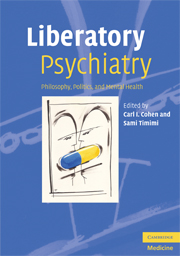Book contents
- Frontmatter
- Contents
- Contributors
- Acknowledgments
- Introduction
- 1 Working towards a liberatory psychiatry? Radicalizing the science of human psychology and behavior
- 2 Power, freedom, and mental health: a postpsychiatry perspective
- 3 Challenging risk: a critique of defensive practice
- 4 Democracy in psychiatry: or why psychiatry needs a new constitution
- 5 German critical psychology as emancipatory psychology
- 6 Psychopolitical validity in the helping professions: applications to research, interventions, case conceptualization, and therapy
- 7 Class exploitation and psychiatric disorders: from status syndrome to capitalist syndrome
- 8 Ecological, individual, ecological? Moving public health psychiatry into a new era
- 9 Children's mental health and the global market: an ecological analysis
- 10 Postcolonial psychiatry: the Empire strikes back? Or, the untapped promise of multiculturalism
- 11 A new psychiatry for a new world: postcolonialism, postmodernism, and the integration of premodern thought into psychiatry
- 12 Neoliberalism and biopsychiatry: a marriage of convenience
- 13 Psychoanalysis and social change: the Latin American experience
- 14 A new psychiatry?
- Index
Introduction
Published online by Cambridge University Press: 25 August 2009
- Frontmatter
- Contents
- Contributors
- Acknowledgments
- Introduction
- 1 Working towards a liberatory psychiatry? Radicalizing the science of human psychology and behavior
- 2 Power, freedom, and mental health: a postpsychiatry perspective
- 3 Challenging risk: a critique of defensive practice
- 4 Democracy in psychiatry: or why psychiatry needs a new constitution
- 5 German critical psychology as emancipatory psychology
- 6 Psychopolitical validity in the helping professions: applications to research, interventions, case conceptualization, and therapy
- 7 Class exploitation and psychiatric disorders: from status syndrome to capitalist syndrome
- 8 Ecological, individual, ecological? Moving public health psychiatry into a new era
- 9 Children's mental health and the global market: an ecological analysis
- 10 Postcolonial psychiatry: the Empire strikes back? Or, the untapped promise of multiculturalism
- 11 A new psychiatry for a new world: postcolonialism, postmodernism, and the integration of premodern thought into psychiatry
- 12 Neoliberalism and biopsychiatry: a marriage of convenience
- 13 Psychoanalysis and social change: the Latin American experience
- 14 A new psychiatry?
- Index
Summary
Pinel's unchaining of the eighteenth century Parisian insane has been an historical metaphor for the dual liberatory underpinnings of psychiatry: it can free persons from social, physical, and psychological oppression, and it can assist persons to be what they can be (i.e., self-realization), and to lead self-directed lives. Thus, psychiatry can help people to be both “free from” and “free to.” These goals not only link psychiatry to medicine and science but also to sociopolitical elements. Hence, two foundational points guide our work: (1) The project of psychiatry has always been one of liberation; (2) Psychiatry's principal object, the mind (i.e., the psychological sphere), is inherently biological and social. If we are to take these two points seriously, it means that psychiatry has a critical and necessary role to play in social struggles that further liberation.
What are the liberatory roles for psychiatry? When we refer to “free from,” we mean that psychiatry can help to free persons from the effects of internal biological forces that contribute to mental illness and distress. In addition, because it is also linked to sociopolitical elements, psychiatry can explore the subjective ramifications of living under a particular social formation. For example, the impact of domination, alienation from the products of one's labor or from one's coworkers, of being treated as a commodity, or of being in a particular social class, gender category, ethnic or racial group.
- Type
- Chapter
- Information
- Liberatory PsychiatryPhilosophy, Politics and Mental Health, pp. 1 - 8Publisher: Cambridge University PressPrint publication year: 2008



